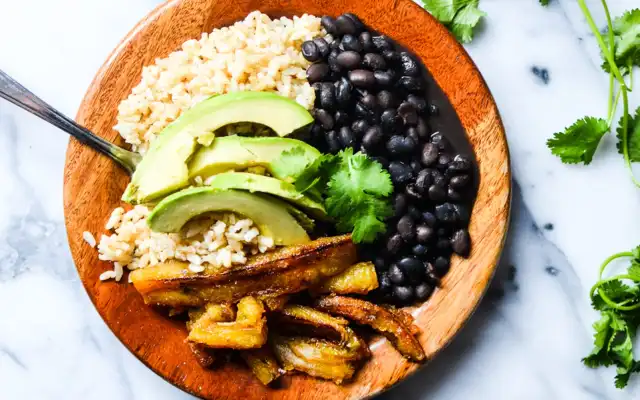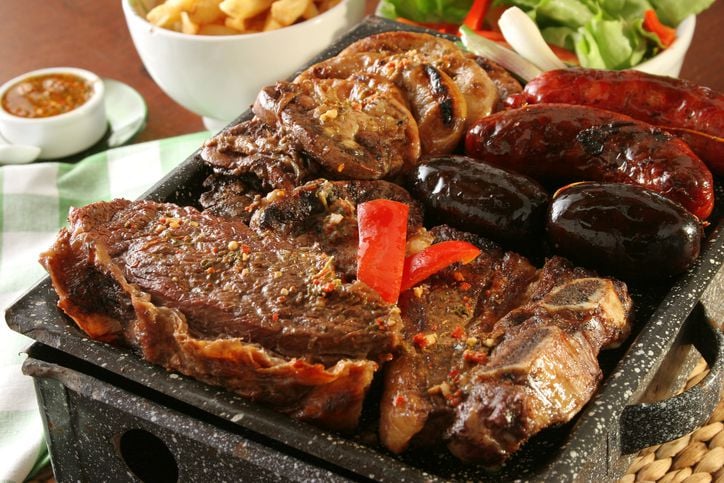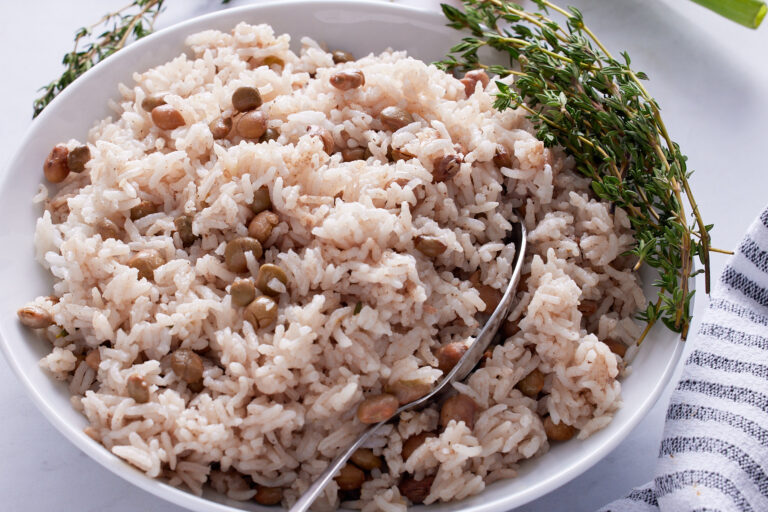Plant-Based Caribbean Cuisine? Yes, It’s Possible!
When people think of Caribbean food, they often picture oxtail stew, jerk chicken, curry goat, and saltfish — heavy, meaty, flavor-packed dishes. But here’s the secret many don’t know: Caribbean cuisine is naturally plant-based at its core.
Root vegetables, legumes, tropical fruits, and leafy greens have been staples of island kitchens for centuries. So if you’re vegan, vegetarian, or simply trying to eat more plant-based, you don’t have to miss out on the delicious flavors of the Caribbean.

In this article, we’re diving into traditional Caribbean recipes vegetarian and vegan versions—showing you how to give your favorite island dishes a plant-based makeover without losing the bold flavors or cultural roots that make them so iconic.
Understanding Caribbean Cuisine: More Than Meat

The Plant-Based Roots of Caribbean Food
Long before processed meat and fast food hit the islands, Caribbean people were already experts in root-to-stem eating.
They lived off what the land and sea provided:
- Plantains
- Yams, cassava, dasheen (taro)
- Callaloo leaves
- Pigeon peas and black-eyed peas
- Breadfruit
- Coconut milk
- Fruits like mango, guava, soursop
So while meat is celebrated in many iconic Caribbean recipes, vegetables, legumes, and fruits were always part of daily life.
The Ital Tradition
Image Suggestion:
A Rasta cook preparing a pot of Ital stew.
ALT text: Rastafarian cook preparing Ital vegan stew.

You can’t talk about vegetarian Caribbean food without mentioning Ital cuisine.
Ital is the plant-based cooking style of the Rastafari movement—centered around natural, unprocessed, and plant-based ingredients. No meat, no salt, no processed food.
Ital cooking has influenced how many Caribbean people view plant-based eating—not as a trend, but as a spiritual lifestyle.
The Challenges of Making Caribbean Food Plant-Based
Let’s be honest—some traditional dishes revolve heavily around animal products:
- Saltfish & Ackee
- Curry Goat
- Oxtail Stew
- Jerk Chicken
The challenge is how to keep the bold flavors, textures, and cultural essence while removing meat and dairy. But the truth is… it’s entirely possible.
How to Veganize or Vegetarianize Traditional Caribbean Dishes
Simple Ingredient Swaps
Here are some of the most effective swaps without losing authenticity:
- Animal Product Plant-Based Substitute
- Saltfish Jackfruit, seasoned tofu, or heart of palm
- Chicken (Jerk) Jackfruit, oyster mushrooms, seitan
- Goat in curry Chickpeas, mushrooms, eggplant
- Dairy in desserts Coconut milk, almond milk, cashew cream
- Meat stock Vegetable broth with Caribbean spices
Caribbean-Friendly Plant Proteins
The Caribbean is blessed with natural plant proteins:
- Lentils
- Pigeon peas
- Black-eyed peas
- Chickpeas
- Tofu (widely used in modern Caribbean vegan cuisine)
- Jackfruit (for texture similar to pulled meat)
Signature Vegan & Vegetarian Caribbean Dishes You Can Make Today
Now, let’s get practical. Here’s how you can turn iconic Caribbean recipes into plant-based masterpieces.
Vegan Jerk Jackfruit
How to make it:
Jackfruit’s shredded texture makes it a perfect stand-in for chicken or pork.
Marinate with traditional jerk seasoning:
- Scotch bonnet peppers
- Allspice
- Thyme
- Garlic
- Scallions
- Soy sauce
Grill or sauté until charred and caramelized. Serve with rice & peas and fried plantains.

Ital Stew
This is the heart of Caribbean vegan cooking—a flavorful, hearty stew without meat or dairy.
Typical ingredients:
- Pumpkin
- Okra
- Dasheen
- Cassava
- Carrots
- Coconut milk
- Thyme, pimento seeds, Scotch bonnet
No artificial flavors, no processed food—just plant-based goodness.
Vegan Callaloo
Callaloo is naturally plant-based but often cooked with salted meat or crab. Here’s how to adapt it:
- Fresh or frozen callaloo leaves (or spinach)
- Okra
- Coconut milk
- Garlic, onion, scallion, thyme
- Scotch bonnet pepper
- Optional: Chickpeas or lentils for extra protein
Plant-Based Caribbean Curries
Swap the meat for:
- Chickpeas
- Potatoes
- Eggplant
- Tofu
Use traditional Caribbean curry powder, coconut milk, and fresh herbs to keep the flavors authentic.
Sweet Plantains & Dumplings
These classic sides are already plant-based. Fried ripe plantains and boiled or fried dumplings are perfect accompaniments to any meal.
How to Keep the Authentic Flavor Without Meat
It’s All in the Seasoning
Caribbean food is not about the meat—it’s about the seasoning.
When you remove the animal product, you need to double down on:
- Fresh herbs (thyme, scallions, parsley)
- Aromatics (garlic, onion, ginger)
- Spices (allspice, curry powder, paprika)
- Heat (Scotch bonnet, habanero)
- Acid (lime, vinegar)
Coconut Milk is Your Best Friend
Coconut milk is a foundational ingredient in Caribbean cooking.
It adds:
- Creaminess
- Sweetness
- Rich texture
Use it in stews, curries, soups, and desserts.
Smoky Flavors Without Meat
Miss the smokiness of grilled meat? Here’s how to recreate it:
- Use liquid smoke sparingly.
- Grill or roast vegetables.
- Char jackfruit, tofu, or mushrooms.
Health Benefits of Plant-Based Caribbean Eating
Beyond flavor, going plant-based Caribbean-style can improve your health:
Lower in Saturated Fat
Eliminating red meat and dairy significantly reduces saturated fat intake, benefiting heart health.
High in Fiber
Caribbean dishes with legumes, root vegetables, and leafy greens are naturally high in fiber, supporting digestion.
Packed with Nutrients
Traditional ingredients like:
- Callaloo (rich in iron)
- Sweet potatoes (Vitamin A)
- Pigeon peas (protein & fiber)
These make plant-based Caribbean food incredibly nourishing.
Common Questions About Plant-Based Caribbean Cuisine
Isn’t Caribbean Food Too Heavy Without Meat?
Not at all. When you build flavor with fresh spices, herbs, and traditional cooking techniques, plant-based Caribbean dishes can be just as satisfying—without the heaviness of animal products.
What About Protein?
Caribbean cuisine is naturally rich in plant proteins:
- Lentils
- Chickpeas
- Black-eyed peas
- Nuts and seeds
- Tofu (modern addition)
Can I Find Plant-Based Caribbean Food at Restaurants?
Yes! Many Caribbean restaurants now offer Ital options or vegan adaptations. And if you don’t see them on the menu—ask!
The Caribbean community is very adaptable and welcoming to plant-based eaters.
Final Thoughts
Caribbean cuisine is about flavor, community, history, and joy.
And that spirit doesn’t require meat or dairy. By adapting traditional recipes into plant-based versions, you’re not erasing culture—you’re honoring it, making it more inclusive, and ensuring it thrives for generations to come.

Whether you’re vegan, vegetarian, flexitarian, or simply curious, Caribbean cuisine has a seat at the table for you.
Disclosure: Our blog contains affiliate links to products. We may receive a commission for purchases made through these links. However, this does not impact our reviews and comparisons. We try our best to keep things fair and balanced, in order to help you make the best choice for you.







